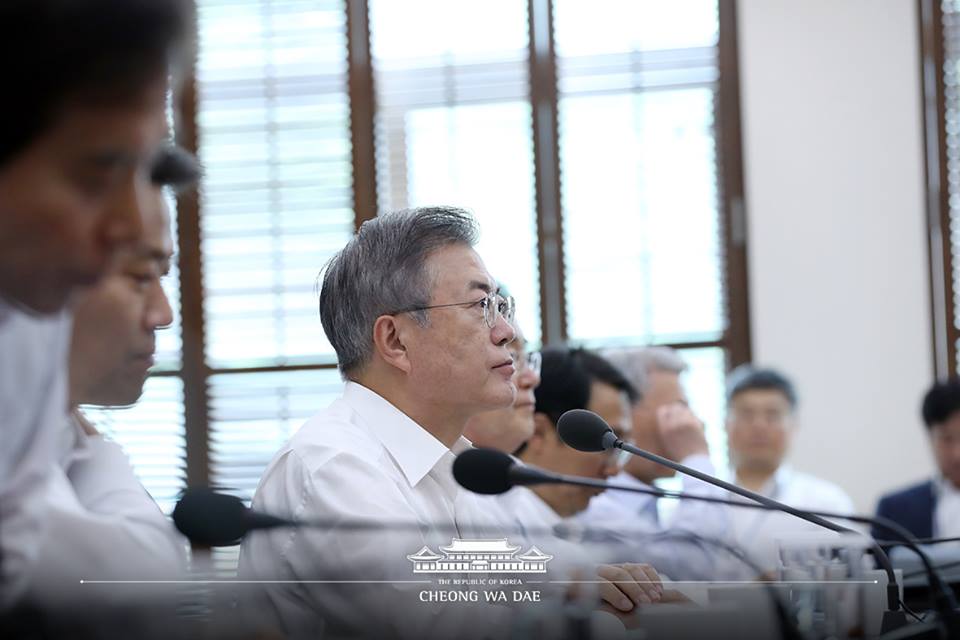News
SKorea leader says Tokyo’s trade curbs will hurt Japan more

President Moon Jae-in accused Japan of abusing its leverage in trade to punish South Korea over their historical dispute. South Korea sees the trade curbs as retaliation for South Korean court rulings earlier this year that ordered Japanese corporations to compensate South Korean victims for forced labour during World War II. (File Photo: 문재인/Facebook)
SEOUL, Korea, Republic Of — In his strongest comments yet on a growing trade dispute, South Korea’s president urged Japan on Monday to lift recently tightened controls on high-tech exports to South Korea, which he said threaten to shatter the countries’ economic co-operation and could damage Japan more than South Korea.
The dispute between the two U.S. allies has further soured relations already troubled over Japan’s colonial rule of Korea before the end of World War II.
President Moon Jae-in accused Japan of abusing its leverage in trade to punish South Korea over their historical dispute. South Korea sees the trade curbs as retaliation for South Korean court rulings earlier this year that ordered Japanese corporations to compensate South Korean victims for forced labour during World War II.
South Korea says the strengthened export controls of photoresists and other sensitive materials mainly to manufacture semiconductors and display screens could hurt its export-dependent economy and disrupt global supply chains.
Its government plans to file a complaint with the World Trade Organization and raise the issue at next week’s WTO General Council in Geneva. Trade officials from the countries failed to resolve the dispute in a working-level meeting in Tokyo on Friday.
Moon also said South Korea will use the dispute as an opportunity to reduce its dependence on Japan by strengthening its technology industry and diversifying import sources.
“Japan’s export restrictions have broken the framework of economic co-operation between South Korea and Japan that had continued over a half-century based on mutual dependence,” Moon said in a meeting of senior aides at Seoul’s presidential palace.
“The shattered credibility of co-operation with Japan in the manufacturing industry will inspire our companies to break out of their dependence on Japanese materials, components and equipment and work toward diversifying import sources or localizing the technologies. I warn that, eventually, it will be the Japanese economy that will be damaged more.”
Moon spoke hours after dozens of South Korean small-business owners rallied in Seoul, calling for boycotts of Japanese consumer goods.
The Japanese measures, which went into effect earlier this month, have stoked public anger in South Korea, where many believe Japan still hasn’t fully acknowledged responsibility for atrocities committed during its colonial occupation of Korea from 1910 to 1945.
Kim Sung-min, president of the Korea Mart Association, urged shop owners to boycott the distribution of Japanese products until Tokyo apologizes over the trade curbs and withdraws them. Other demonstrators held up signs that read, “Our supermarket does not sell Japanese products.”
Thousands of South Koreans have signed petitions posted by citizens on the presidential office’s websites that called for boycotts of Japanese products and of travel to Japan and for South Korea to skip next year’s Tokyo Summer Olympics. Retailers have also reported modest drops in the sales of Japanese beer.
“We will continue boycotting the consumption and distribution of Japanese products until Japan’s government and the Abe administration apologizes and withdraws its economic retaliation,” Kim said, referring to Japanese Prime Minister Shinzo Abe.
Tokyo says the materials affected by the export controls can be sent only to trustworthy trading partners. Without presenting specific examples, Tokyo has questioned Seoul’s credibility in controlling the exports of arms and dual-use items that can be used both for civilian and military purposes. Abe and his conservative aides suggested there may have been illegal transfers of sensitive materials from South Korea to North Korea.
South Korea says its export controls are working just fine. Last week, its presidential office proposed an investigation by the United Nations Security Council or another international body to look into the export controls of both South Korea and Japan as it continues to reject Japanese claims that the South cannot be trusted to faithfully implement sanctions against North Korea.

